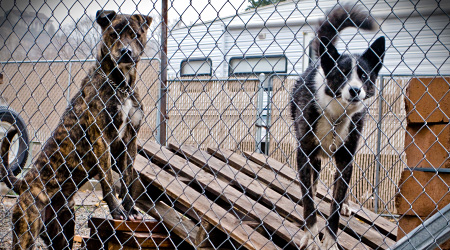How To Reduce Rates On Home Owner Insurance For Dog Owners

Purchasing homeowners insurance for many years entailed simply calling up your family insurance agent and everything was taken care after that. You would have a blanket policy which covered your home and possessions and insurance rates would be consistent with friends and family. Nowadays, it is significantly more complicated as there are many additional criteria which factor in to insurance premiums such as where you live, if you have security or operate a home office. One of these factors which could actually prevent a homeowner from purchasing insurance is being a dog owner.
Why would being a dog owner prevent the purchase of homeowners insurance or significantly increase insurance rates? The insurance industry pays out over $1 billion a year in claims to victims of dog bites. It is unfortunate that a small minority of homeowners with aggressive breed dogs can cause an entire industry to alter its behavior. However, almost half the households in America own at least one canine so what are homeowners to do if they want to own a dog but don't want to pay sky high premiums.
First, understand which canine breeds are blacklisted or considered high risk when purchasing a dog for the family. Three dog breeds, which include German shepherds, Rottweilers and pit bulls, account for almost 2/3 of all deaths resulting from dog attacks. If you purchase one of these three breeds there is a very high probability that your insurance company will refuse to cover your home. If you purchase a dog after the fact and a claim is made, the claim may be paid but it is likely that your insurance company will drop your coverage. Other breeds are considered high risk which may mean paying significantly more in insurance rates than you would by having a non-high-risk dog. Speak with your homeowners insurance agent prior to purchasing a dog to make sure there aren't any problems with coverage.
If you do decide to own a blacklisted or high-risk dog there are certain steps you can take to protect yourself and your animal and possibly avoid insurance claims. These suggestions apply to all pet owners and not just high-risk dog owners. Obedience training can make a significant difference regarding control which is one of the primary causes of dog attacks. Responding to the heel command, coming when called, staying within a fenced area and not pulling on a leash are all crucial to maintaining control of a canine. Socialization is another important aspect to ensure proper behavior. At a young age, from puppy on, provide ample interaction with other dogs as well as people. The more comfortable they are around strange individuals and dogs the less likely they are to act aggressively.
It is also important to maintain proper animal health with regular veterinary visits. Animals tend to react aggressively when in pain due to fight or flight instincts. A dog which may not normally bite someone could feel threatened if they are currently experiencing pain or discomfort and someone they do not know tries to interact with them. Getting an animal spayed or neutered is also an important step as it tends to decrease hormones leading to less aggressive behavior. As many pet owners already know, a healthy animal is a happy animal. Older animals in particular need more tender loving care and may require baby aspirin to alleviate aches and pains. Taking steps to make sure your dog is healthy is not only common sense for animal owners but medically necessary to prevent behavioral problems.
If you're a dog owner and you want to reduce rates on your home owners insurance you must be proactive and work with your insurance company to alleviate their fears. The steps above don't guarantee you will get coverage or see a reduction in rates but it shows that you are a responsible pet owner willing to do whatever it takes to ensure the health and happiness of your dog. A certificate of obedience, proof of spraying and neutering and a well enclosed residence will all help in convincing an insurance company that you're proactively trying to keep yourself, your animal and the neighborhood safe.







